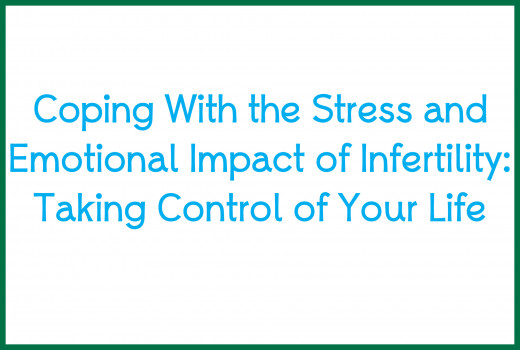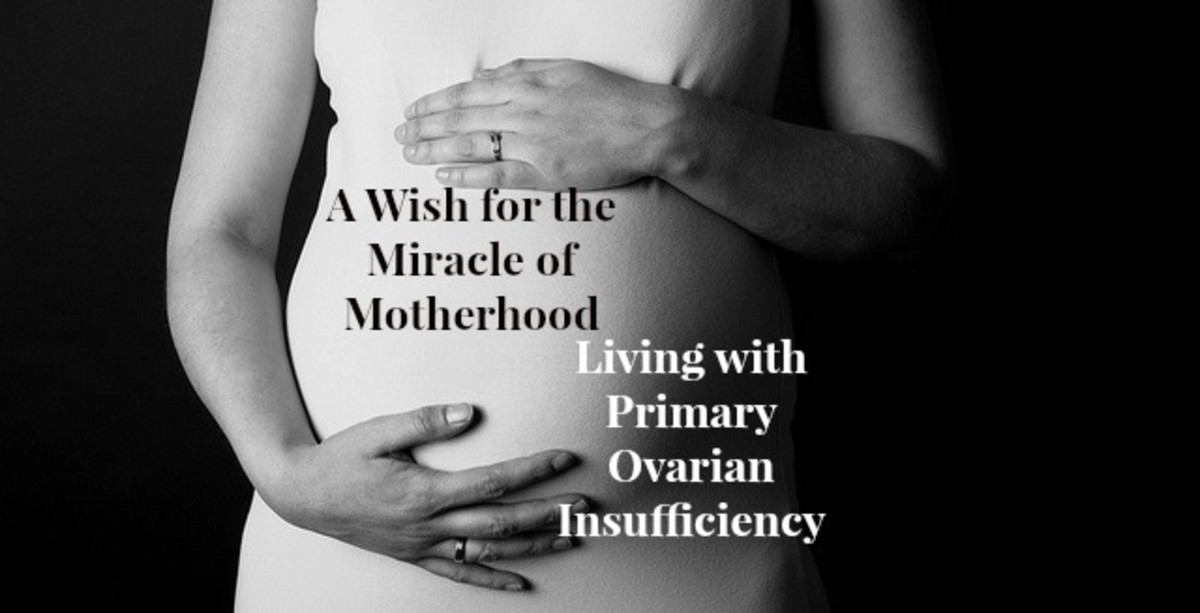Coping With the Stress and Emotional Impact of Infertility: Taking Control of Your Life

Infertility affects one in eight couples or approximately 12 percent of married women. It often comes with anxiety, shame, stress, general emotional turmoil, and even depression. Infertility can put significant strain on a marriage. It also makes many people feel as though they have failed at something, which can be devastating for self esteem.
Even under the best circumstances, couples have very little control over their fertility and the outcome of their struggles with infertility. This lack of control can be crippling, compromising your daily routine and general ability to function at work and with family and friends. Don't let infertility control your life. There is no single strategy that has helped me keep my sanity during four years of infertility. However, there are several key tactics that have helped me and that I believe can help others facing similar struggles.


Make your health a top priority without getting obsessive about diet or exercise
If you're trying to get pregnant, most likely you're already focused on eating healthy and getting regular exercise. One of the primary philosophies that I live by is everything in moderation. There is no need to let diet or exercise take over your life just because you're trying to conceive. Yes, eating well and making exercise a part of your daily routine are highly recommended strategies for boosting fertility. They'll also help you keep your spirits up. Eating lots of junk and sitting on the couch is not the answer to depression. This doesn't mean that every meal or snack must revolve around foods that are supposed to boost fertility. If you skip a couple days of exercising or take a break from regular workouts for two weeks, or even longer, don't beat yourself up over it.
Our TTC Journey Part 1- Struggling with Fertility
Take a major step away from social media, especially Facebook
I know that there is a lot of controversy and general sensitivity about pregnancy vs. infertility and Facebook. Couples struggling with infertility feel alienated from Facebook completely because they're constantly bombarded with updates about pregnancy and children. People who are pregnant or have children get offended because they feel like they can't share their joys. And the vicious cycle continues.
The whole thing really disgusts me. Many people share anything and everything on Facebook all day long, not giving a second thought to how their words may affect others. The Facebook "like" has become the biggest cop out of the decade. It enables people to believe that they show that they care, even though they're too lazy to leave a comment, much less engage with the content in any way (i.e. click on a link, share feedback about it via email, text, or phone).
Needless to say, I had been on the fence about being active on Facebook before I ever faced infertility. I finally decided to quit reading my news feed over a year ago, and I've never looked back. In hindsight, I wish that I'd quit two years before that. If I didn't make 97% of my income online, I would step back even further than giving up the news feed. However, having an online presence is critical to my success professionally. As such, I can't stop using Facebook altogether.
For me, the best thing that I can do on Facebook is limit my involvement to checking in with a very select number of individuals and pages (less than a dozen) and posting at most once per day on my personal account. This does mean that I miss a lot of major news from family and friends. However, most people have been very understanding of this decision and are happy to fill me in about news in person or over the phone, which is how I'd rather hear it anyway. I know that many Facebook users simply feel that they can't cut back this much. If you haven't taken that leap, I urge you to try it for a week or two and see how you feel.


Pursue your passions
In December 2012, nearly two years after my husband and I started trying to conceive, we adopted two kittens and I bought my first DSLR. It may seem really weird to make a big point about these two events in this article, but they have been two of the best things that I've done during this time in my life.
For years, my husband and I didn't consider the idea of adopting kittens because we had limited living space, money, and time. We also had an older cat who had never lived with other cats, and we didn't know how she would do with kittens. We reached a point where living space, money, and time weren't issues and we were ready to take the gamble, so we went for it. We were so fortunate to be able to adopt two little orange tabbies who are amazingly sweet and completely won over our old cat. I'm so glad that she was able to know them for the last two years of her life.
Photography has been a huge way for me to have control in my life and take a lifelong interest to a new level. When I bought my Canon Rebel, I knew very little about DSLR photography and what is truly possible with DSLR shooting and RAW editing. If I knew how much owning this camera would change my life, I would have bought it years ago. Again, I'm sure that bettering my photography skills may seem like an odd way to find peace while struggling with infertility. For those who are struggling, I hope that it does make sense and that you can pursue a similar means of finding peace in your own life.
In short, if there is something that you've been putting off because you've been trying to have kids, don't put it off any longer. It may end up being the best thing that you do this year.
How to stay positive with infertility
Don't let infertility stop you from enjoying life
Some people fall into the trap of believing that they should feel guilty about doing things that they wouldn't be able to do if they had children. No matter how much you want to have kids, there is no denying the fact that not having children comes with a huge amount of freedom. I never have to think about when I schedule a haircut or a dentist appointment, let alone plan a weekend away with my husband. I am very aware of these luxuries and do my best not to take them for granted. I also don't discuss this sort of thing with my friends who do have children, as it's not something that they want to hear.
One of the biggest things that I've embraced during my struggles with infertility is planning for the future without kids. For example, when I moved to Milwaukee for my husband's medical residency, I didn't plan on participating in a lot of craft fairs because I thought that I'd be pregnant by the end of his intern year. When it became clear that we weren't going to conceive any time soon, I started signing up for fairs, many of which were at least six months away. These fairs have been a great way for me to connect with other artists and become involved in Milwaukee's art community. I'm grateful to have had these experiences.
Yes, at this point, on any given night of the week, I would rather be hanging out at home with my husband and kids than doing literally anything else in the world. But since I can't, there's no point in sitting around feeling sorry for myself about it. If my husband and I feel like attending a concert, enjoying a long dinner out, or going to some other sort of evening event in Milwaukee, we do. Whether or not we ever have children, we'll always have these memories together.
This is the first article that I ever wrote about infertility, nearly two years ago. If you're looking for more infertility coping tactics, give it a read.
- Coping With Infertility
Thousands of couples deal with infertility every year, which may lead to grief and depression. There are a variety of strategies to cope with infertility that can alleviate these issues.
© 2015 Rose Clearfield










